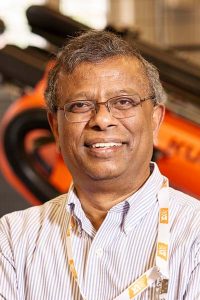Department of Defense Extends UT-Led MURI Award

One of the premier research projects that the US Department of Defense grants to universities is through its Multidisciplinary University Research Initiative (MURI) program, which brings together institutions from around the world to focus on a scientific topic that is important to the military.
UT–Oak Ridge National Laboratory Governor’s Chair for Advanced Manufacturing Suresh Babu was chosen to lead such a project in 2018 for the US Navy, one of only 24 selected out of 436 proposals that year. That project is related to additive manufacturing of metals and alloys, also referred to as 3D printing.
As prestigious as that selection was, Babu and his collaborators across the US and Australia have taken it even further, receiving an extension to their grant as a sign of how important that research is, and how well the team is executing it, even with COVID-19 challenges. The overall MURI technical program is managed by Program Officer Jennifer Wolk from the Office of Naval Research.
“It is a great recognition and honor to have gained continued support from the Department of Defense for our research into additive manufacturing of metals that are critical for them and the work that they do,” said Babu, from the Department of Mechanical, Aerospace, and Biomedical Engineering in UT’s Tickle College of Engineering. “Additive manufacturing is a massively non-equilibrium process that has taken materials science into completely uncharted territory. I am so delighted with the way that the MURI and AUSMURI groups have come together to form an international research team to tackle this vital exploration challenge.”
Professor Hahn Choo of UT’s Department of Materials Science and Engineering is also on Babu’s US team. The overall team includes the University of Sydney and the University of New South Wales in Australia, which operate under the AUSMURI program in conjunction with the MURI program in the US.
“The extension of this MURI award is a reflection the quality of work being done by Suresh and his team, as well as an acknowledgement of the success of the collaboration between universities across the US and Australia,” said Tickle College of Engineering Dean Matthew Mench. “Their work will play a key role in the national security of both countries in the coming years, making their breakthroughs all the more important.”
Other US collaborators and institutions involved are Professor James Kong at Virginia Tech, Professors Carolin Fink and Joerg Jinschek at Ohio State University, Professor Pete Collins from Iowa State, Professor Amy Clarke from the Colorado School of Mines, and Professor Tresa Pollock from the University of California-Santa Barbara. The new extension will be for $1.5 million a year for two years.
Together, the teams are working on exploring all aspects of additive manufacturing of metals in use by the defense forces of both countries, including solidification, solid-state transformation, deformation, defect structures, and microstructure evolution, as well as how rapid heating or cooling affects the materials at both small and large scales.
“Beyond the great efforts made by the AUSMURI teams at the University of Sydney and UNSW during the annual review processes, our project has so far been hugely successful because of the breakthrough research in understanding new ways that phase transformations work in the extreme conditions of additive manufacturing, which will help us design new materials with remarkable structural properties,” said University of Sydney Professor Simon Ringer, Australia’s lead on the project.
While the work is being done with defense concerns in mind and is sponsored by the Office of Naval Research on the US side and the Australian Defense Science and Technology Organization on its side, it is translational to other areas of advanced manufacturing, making it beneficial across the board.